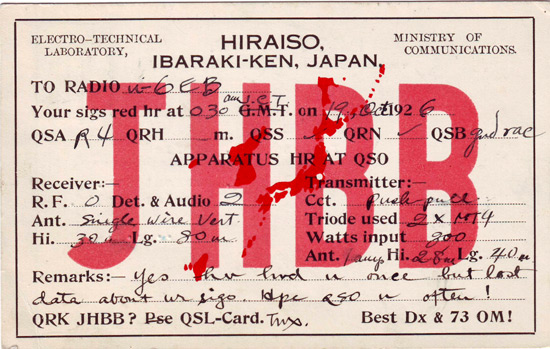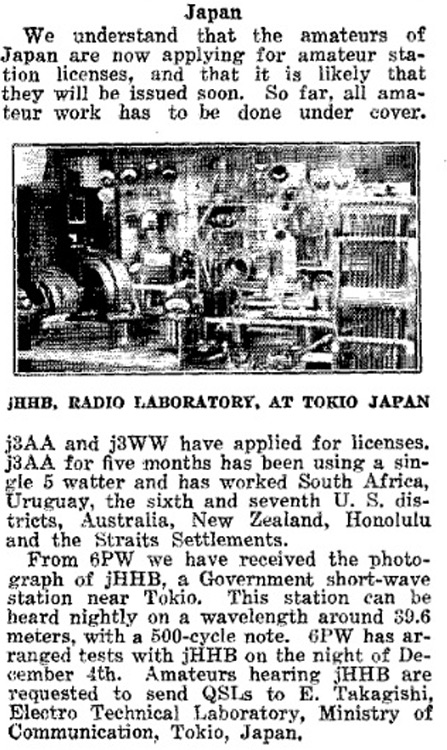

JHBB 1926 Japan

Article from Dec. 1926 QST
In the 1920's, JHBB was the
call-sign of an early experimental short-wave radio station in
Hiraiso, Ibaraki prefecture, Japan. The operators experimented
with wireless telephony and broadcasting. Transmission tests were
regularly broadcasted on short-wave in phone and CW. Reception
reports were greatly appreciated. They also tried to make two-way
QSOs with other radio amateurs worldwide.
On the other end, the brothers Howard C. Seefred (6EA, u-6EA, W6EA) and Lyndon F. Seefred (6EB, u-6EB, W6EB) were early amateur radio operators in Los Angeles,
California, likewise experimenting on short-wave and especially
interested in listening and transmitting to remote stations and
trying to achieve always new long distance records by wireless
communication.
The brothers also knew about JHBB and did not only try to pick up
the transmissions from Japan, but were also interested to know
whether their own transmissions could be copied in Japan.
The depicted JHBB QSL card confirms the reception of a wireless
transmission by Lyndon (u-6EB) on Oct. 19, 1926. The wording
"Yes hr hrd u once" indicates that Lyndon was the
initiator of this communication by mail.
The QSL card was postmarked on the "15 12 22" (in the
"YY MM DD" format), which corresponds to the date of
"22 December 1926" (=the 15th year of the Emperor
Taisho whose era started in 1912 and who died just three days
after this card had been mailed).
From these early Amateur Radio activities by JHBB the original
QSL portfolio which contains many QSL cards and letters of radio
amateurs and short-wave listeners from all over the world has
survived, and also a notebook in which the correspondence with
these radio amateurs was captured by date, with entries from July
1926 (Taisho 15) until June 1928 (Showa 3). All these documents
are accessible for the public on a Japanese website (Link: http://hp.jpn.org/JR1YPU/JHBB-QSL).
This website also provides the links to the original documents
from both Seefred brothers. There is Lyndon's (u-6EB) letter of
Nov. 21, 1926 to J-JHBB (Link: http://hp.jpn.org/JR1YPU/JHBB-QSL/16-01.jpg), in which he wrote how he had heard the CW signals of
JHBB on Nov. 3, 1926. He expressed his hopes to "qso"
JHBB "some time", and then asked: "Have you ever
heard me?". After a short description of his station he
asked to send him "a description or photo" of the
station, and he promised to do the same.
The correspondence book of JHBB has one entry for u-6EB under the
date of "15.12.20" which is the 20 December 1926 (Link:
http://hp.jpn.org/JR1YPU/JHBB-QSL/00-02.jpg), just 2 days before the depicted QSL card of JHBB was
postmarked. Therefore it can be safely assumed that this QSL card
was sent in response to Lyndon's letter and that it gave
definitely the answer to his question whether JHBB had ever heard
him. Indeed he had.
The website also provides a link to a QSL card from his brother
Howard C. Seefred (nu-6EA), on which he reported that he heard
the "voice" of JHBB on 40m on Nov. 27, 1926, and asked
for a confirmation of his reception report with a card, because,
as he stated: "This is the greatest distance I have ever
heard a radio telephone". (Links: http://hp.jpn.org/JR1YPU/JHBB-QSL/36-01.jpg + http://hp.jpn.org/JR1YPU/JHBB-QSL/36-03.jpg)
Further links with station photos and antennas of JHBB:
http://hp.jpn.org/JR1YPU/eme/index.html
https://www.hamlife.jp/2015/01/10/jhbb-qsl/
Seefred brothers:
https://oac.cdlib.org/findaid/ark:/13030/c8bz66ts/entire_text/
QSL + Info
courtesy of Norbert Maibaum
Permission of QST Article courtesy of ARRL